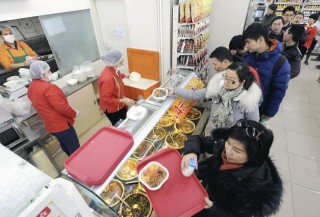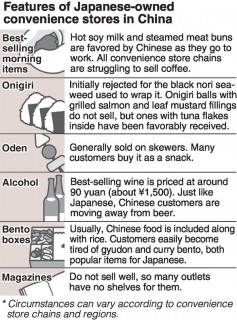Loading
Search
▼ Japanese Convenience Stores Hot in China
- Category:Shopping
BEIJING — Japanese-owned convenience store chains are stepping up efforts to expand their business operations in China, hoping to take advantage of an increase in the number of young middle-income Chinese, who have become important customers.
Currently, Japanese convenience store operators own about 3,500 outlets in China.
However, the rise in the number of Japanese convenience store outlets there has coincided with such problems as a surge in rent fees charged to operators seeking to open new stores in urban areas, as well as a chronic labor shortage.
“I buy lunch here every day. I feel safer [buying it here] than at Chinese-owned convenience stores,” Wang Xuejing, a Chinese office employee, said as she left a Seven-Eleven outlet in Beijing’s office district.
The Seven-Eleven lunch most favored here is the bento box, into which customers can add freshly boiled rice and their favorite ready-made food at an in-store counter. Although this kind of bento is more expensive than the prepackaged variety, the line of customers waiting to select bento items at lunchtime seems to have no end.
Seven-Eleven has built an unusually strong brand-name image as a delicious bento retailer in Beijing. “Their bento tastes really good,” said an official of another convenience store chain.
In 1996, Lawson, Inc. became the first Japanese convenience store chain to start operations in China. The company played a pioneering role in ensuring that onigiri (rice balls) and oden (a hodgepodge of various soy-sauced ingredients) were accepted as hot-selling items in the country, despite the prevailing notion that they were products that would not sell in China.
Currently, Japanese convenience store operators own about 3,500 outlets in China.
However, the rise in the number of Japanese convenience store outlets there has coincided with such problems as a surge in rent fees charged to operators seeking to open new stores in urban areas, as well as a chronic labor shortage.
“I buy lunch here every day. I feel safer [buying it here] than at Chinese-owned convenience stores,” Wang Xuejing, a Chinese office employee, said as she left a Seven-Eleven outlet in Beijing’s office district.
The Seven-Eleven lunch most favored here is the bento box, into which customers can add freshly boiled rice and their favorite ready-made food at an in-store counter. Although this kind of bento is more expensive than the prepackaged variety, the line of customers waiting to select bento items at lunchtime seems to have no end.
Seven-Eleven has built an unusually strong brand-name image as a delicious bento retailer in Beijing. “Their bento tastes really good,” said an official of another convenience store chain.
In 1996, Lawson, Inc. became the first Japanese convenience store chain to start operations in China. The company played a pioneering role in ensuring that onigiri (rice balls) and oden (a hodgepodge of various soy-sauced ingredients) were accepted as hot-selling items in the country, despite the prevailing notion that they were products that would not sell in China.
Currently, Lawson is trying hard to increase its dessert sales in China, and its mildly sweet cakes are now enjoying popularity. There is a belief that no convenience store in China can beat Lawson when it comes to dessert.
Meanwhile, FamilyMart Co. has the advantage of cooperative ties with local governments in China through its joint management with a Chinese corporation. FamilyMart currently operates more than 100 outlets inside subway station buildings in Shanghai, where large numbers of commuting workers and students buy goods. Most of these outlets have places to sit and eat, contributing to an increase in their sales.
Each Japanese-owned convenience store chain places importance on the Chinese sense of taste. For instance, hot soy milk outsells coffee here. In addition, since Chinese customers easily become tired of eating curry-and-rice and gyudon (beef bowl) bento, the two most popular varieties in Japan, bento in China mainly includes Chinese food and boiled rice.
Moreover, convenience store chain operators do not adhere to the Japanese style of service, a decision that serves to attract local customers.
As of the end of February, Seven-Eleven had 1,194 outlets in China, while Lawson had 655 and FamilyMart had 1,530.
Individual customers’ consumption has grown steadily in China, despite widespread concerns about the nation’s economic slowdown, mainly in the manufacturing sector. Admittedly, the three leading Japanese convenience store chains are having problems attracting enough customers in provincial areas, where the impact of the economic slowdown is particularly evident.
However, they remain convinced that the number of middle-class customers in China’s urban areas will continue to increase, and are planning to open more outlets in the country.
On the other hand, the convenience store chains face problems peculiar to China. They include high rents for the buildings used for outlets and electricity bills that are higher than in Japan. “Opening an outlet in Shanghai requires an amount of money comparable to that of Japan’s Ginza,” a Lawson official said.
The chain operators are also facing a chronic shortage of job candidates that can meet the needs of customers. In Beijing, Shanghai and other large cities, in fact, it is impossible to secure enough employees only through hiring Chinese from provincial areas who come to urban centers for work.
“We’re visiting neighboring cities to recruit employees, and attracting them with the offer of dormitories,” a Seven-Eleven official said.
By Hideo Kamata / Yomiuri Shimbun Correspondent
Meanwhile, FamilyMart Co. has the advantage of cooperative ties with local governments in China through its joint management with a Chinese corporation. FamilyMart currently operates more than 100 outlets inside subway station buildings in Shanghai, where large numbers of commuting workers and students buy goods. Most of these outlets have places to sit and eat, contributing to an increase in their sales.
Each Japanese-owned convenience store chain places importance on the Chinese sense of taste. For instance, hot soy milk outsells coffee here. In addition, since Chinese customers easily become tired of eating curry-and-rice and gyudon (beef bowl) bento, the two most popular varieties in Japan, bento in China mainly includes Chinese food and boiled rice.
Moreover, convenience store chain operators do not adhere to the Japanese style of service, a decision that serves to attract local customers.
As of the end of February, Seven-Eleven had 1,194 outlets in China, while Lawson had 655 and FamilyMart had 1,530.
Individual customers’ consumption has grown steadily in China, despite widespread concerns about the nation’s economic slowdown, mainly in the manufacturing sector. Admittedly, the three leading Japanese convenience store chains are having problems attracting enough customers in provincial areas, where the impact of the economic slowdown is particularly evident.
However, they remain convinced that the number of middle-class customers in China’s urban areas will continue to increase, and are planning to open more outlets in the country.
On the other hand, the convenience store chains face problems peculiar to China. They include high rents for the buildings used for outlets and electricity bills that are higher than in Japan. “Opening an outlet in Shanghai requires an amount of money comparable to that of Japan’s Ginza,” a Lawson official said.
The chain operators are also facing a chronic shortage of job candidates that can meet the needs of customers. In Beijing, Shanghai and other large cities, in fact, it is impossible to secure enough employees only through hiring Chinese from provincial areas who come to urban centers for work.
“We’re visiting neighboring cities to recruit employees, and attracting them with the offer of dormitories,” a Seven-Eleven official said.
By Hideo Kamata / Yomiuri Shimbun Correspondent
- April 8, 2016
- Comment (0)
- Trackback(0)



